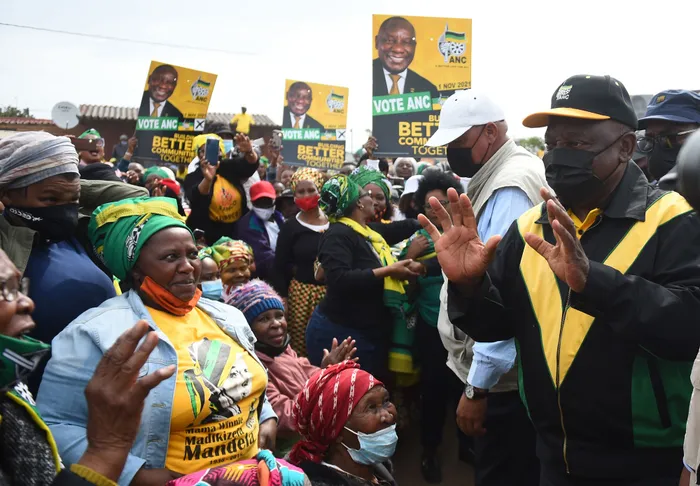South Africa needs a Social Democratic Revolution

ANC supporters including senior citizens from Ward 93 in Green Point and Qandu-Qandu informal settlement greeting the party's president Cyril Ramaphosa as he arrives to address them. Ramaphosa is in the Western Cape to campaign for the upcoming local government elections. Picture : Phando Jikelo / African News Agency(ANA)
By Dennis George
The economy-destroying load shedding campaign of Eskom, and the failure by the power utility's senior management to conduct collective bargaining pro-actively had devastating consequences for the struggling economy, employment creation in addition to the achievement of higher inclusive economic growth and social cohesion for the country.
To make matters worse, Eskom nevertheless signed a 7 percent across-the-board wage increase plus an additional R400 per month for housing allowance, while the cash-strapped state-owned company struggle to service its cripple R390 billion mountain debt. Eskom afterwards argued it has no idea where they will find the funds to pay for the additional R1 billion to be added to the salary bill.
Politically, the ANC has not considered how to deal with Zondo Commission recommendations on state capture, cadre deployment, and corruption, while former finance minister Trevor Manuel argued that unless the ANC learnt the lessons handed to it in the local government elections, it was doomed. Manuel referenced the Biblical words of Proverbs 29:18: “A people without a vision will perish.” The volume of recommendations related to South African Airways, the New Age and its dealings with government departments and State-Owned Entities, as well as the South African Revenue Services (Sars) and public procurement.
Politically, the implementation of structural reforms has been slow; mainly due to a lack of political consensus among government, business, labour and civil society.
The catastrophic economic disaster in which the country find itself, the rand fell to its lowest level since October 2020, while weaker commodity prices hammer the local economy, inflation is up at 8 percent year on year, as fuel prices continue rising, which has a transmission into food and transport prices. As well as the fear that the global economy will sink into a recession. To make economic matters worse, the South African Reserve Bank Monetary Policy Committee will have no choice but to increase the repo rate, which will have a direct impact on mortgage bonds and other financial instruments such as car loans. The yield on the R2,030 government bond rose to 10.62 percent, this movement was last seen at the beginning of the Covid-19 pandemic.

South Africa needs a Social Democratic Revolution (SDR) driven by ethics and dedicated leadership, who must place the country before political parties. Social democracy rests on three fundamental features, namely democracy relating to equal rights to vote and form parties, secondly, an economy partly regulated by the state a combination of Keynesian and other political and economic measures, and thirdly a welfare state offering social support to those in need of education, health services, safety and security, SMME and entrepreneurial support specifically for young people and women, and build a Social Democratic Movement.
The SDR will only succeed if the financial sector, specifically the banks is transformed to ensure that financial instruments are designed to cater for the specific needs of SMMEs and youth entrepreneurs. During the Covid-19 pandemic, the government launched a scheme of R500 billion stimulus packages to support the economy, where businesses could draw down loans from the participating banks. The scheme is based on a partnership between the National Treasury, the South African Reserve Bank (SARB) and the Banking Association of South Africa (BASA) to support struggling businesses. The scheme was criticised for its stringent conditions, which has led to poor take-up. Many stressed companies have been reluctant to take on more liabilities, and importantly black SMMEs did not even bother to apply because banks were not interested.
Interestingly, Chief Justice Raymond Zondo's final report lambasted the banks for rushing to close bank accounts belonging to various companies and recommended that relevant existing legislation governing banks be amended to introduce this requirement of fairness or, a new piece of legislation to be enacted which will make this a requirement. The final Report stressed that banks would need to afford the client a proper opportunity to be heard and should not merely go through the motions or pay lip service to the principle of audi alteram partem (hear the other side). Zondo has determined that any company (and individual) should be given a fair and reasonable opportunity to defend itself, and the same should apply with SMMEs’ loans, working and equipment capital to establish their businesses.
The SDR should focus on labour-intensive sectors like tourism, hospitality and agriculture for young people to start SMMEs and explore entrepreneurial opportunities. The SDR will need thousands of volunteers to support youth to start and grow the SMMEs and develop entrepreneurship opportunities.
The sports industry is a prosperous business that generates millions each year and provides many sports-related careers that offer high salaries and long-term job security. Sport is another sector that is closely related to tourism and hospitality that could provide opportunities for young people. South Africa is the rugby world champion, and it is evident from the fully booked stadiums that demand is high and could benefit restaurants and bars to create employment opportunities. Young people like to participate in sports, however, sports coaches and mentors need to be employed. It is therefore important for the SDR to develop a national vision to make South Africa a winning nation. Although the National Lotteries Commission injected over R4 billion into the development of sport and recreation over the last 16 years, more has to be invested to support youth employment creation for sports development and entrepreneurship to build a healthy, winning nation. Equity, access and development are key themes in the sports industry to support national sporting bodies, regional bodies, local sports clubs, recreational clubs and schools.
George is the former general-secretary of Fedusa
This article is original to The African. To republish, see terms and conditions.